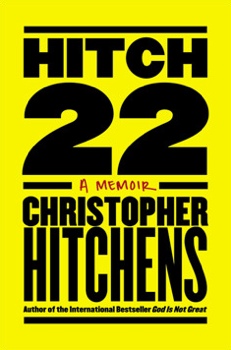
I purchased Christopher Hitchens’s bestselling memoir as soon as it was available in 2010. It took until now for me to read it. I sincerely regret the belatedness. Now, with just a few days until the first anniversary of his death on 15 December, I can say I have somewhat made amends by reading Hitch-22, Letters to a Young Contrarian and Mortality all within the last month. Although I just finished the touching and brutal Mortality, I would like to focus on his memoirs.
If only I were smart enough for Oxford, spent 40 years as an active journo and world-traveling speaker, then maybe — just MAYBE — I might be able to write as well as Hitch. Others more erudite than myself (if not the equal of the great man himself) have written of the quality and quantity of his intellectual fortitude. Take for example Graydon Carter’s foreword to Mortality. All I can express are my experiences as a reader.
I came to Hitchens late, in his final decade of ever active duty. Thus it was a pleasure to read about his early life as a “rabble-rouser” (a term he denied) and all the amazing people he befriended or interviewed. The memoir is less an autobiography than an account of the intellectual history of Christopher Hitchens. Great events of history are weaved with the telling of his relationship with the capital-L “Left” (of them, but not of them). As with most of his work, this one was very engaging and having watched plenty of Hitch’s speeches and debates that I feel I could clearly hear his voice sub-vocalized as I read the words on the page.
In a sentence: the book is about his journey learning how to think for himself rather than aligning with allegiances, or taking “the party line.” To change one’s mind is not hypocrisy — it is a willingness to be informed. Hitch brings up John Maynard Keynes’s question: “When the facts change then my opinion changes: and you, sir?” This of course is given that the cause of change is based on reasoned evidence and not political convenience.
However, it does not end there. Once one has taken “some kind of intelligibly vertebrate position” one must speak up. Thus the meaning of the phrase “Hitch-22”: to reject literalism and those that deal in absolutes, yet argue forcefully for a concrete wrong and right. Hitch uses dichotomy as a device throughout the book, and successfully demonstrates F. Scott Fitzgerald’s assertion that “The test of a first rate intelligence is the ability to hold two opposed ideas in the mind at the same time, and still retain the ability to function.” And boy, could he function.
It makes me reflect on my own intellectual history: from pseudo-socialist punk rock teenager to The Economist-fed centre-right internationalist realist and most recently a principled constructivist. I too have veered from one alignment to another, finally finding my own path, one that I am still forging.
In 2010 I started a note called “My philosophical interests and positions” in which I tried to hash out my own opinions on such topics as:
- Philosophy of religion (atheist and humanist)
- Ethics (consequentialist)
- Epistemology (critical rationalism)
- Positivism (Khun) I am sometimes asked about the concept or definition of a “public intellectual,” and though I find the whole idea faintly silly, I believe it should ideally mean that the person so identified is self-sustaining and autonomously financed.
Hitch gave the example of Susan Sontag as an ideal public intellectual. I believe the above passage reflects my own distinction between public intellectual and pundit.
The usual duty of the “intellectual” is to argue for complexity and to insist that phenomena in the world of ideas should not be sloganized or reduced to easily repeated formulae. But there is another responsibility, to say that some things are simple and ought not to be obfuscated …
Ah, another Hitch-22.
He was an intellectual powerhouse, prolific and a polymath. All the things we wish in a public intellectual. Although he declined the designation of brave or courageous, I think the following shows the kind of selfless dedication to his craft and audience.
On the morning of July 8 2010 he found out about his cancer. It was the first day of his national book tour for Hitch-22. He had an appointment with Salman Rushdie for a conversation at the 92nd St Y in New York (where I had the pleasure of meeting Robert Kaplan), and an appearance on The Daily Show with Jon Stewart. He pulled off both flawlessly, with none the wiser. I feel it is somewhat poignant to watch the interview with Jon Stewart knowing what we know now. All class.

